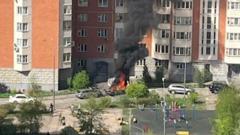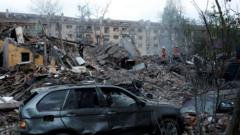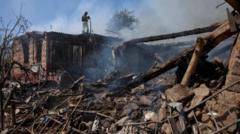A senior Russian general, Gen Yaroslav Moskalik, was killed in a car bomb attack in Moscow, raising alarm over security and escalating tensions in the region, particularly regarding the ongoing conflict with Ukraine.
**Senior Russian General Killed in Moscow Car Bomb Attack**

**Senior Russian General Killed in Moscow Car Bomb Attack**
Senior Russian military official killed in Moscow as tensions rise amidst ongoing Ukraine conflict.
The Investigative Committee of Russia confirmed that Gen Moskalik died when a bomb exploded in a Volkswagen Golf parked near his home in Balashikha, a suburb of Moscow. The explosive device was reportedly filled with pellets and detonated as Moskalik walked past the vehicle. Known for his involvement in the Minsk agreements aimed at resolving the Ukraine conflict, Moskalik's assassination is notable amid the backdrop of complex Russo-Ukrainian relations.
As videos of the burning car circulated on Telegram, the incident went unanswered by any claimant, and its implications remained speculative in a tumultuous political climate. This attack comes before a scheduled meeting between U.S. special envoy Steve Witkoff and Russian President Vladimir Putin in Moscow, where discussions were expected to revolve around a potential deal to end hostilities in Ukraine.
In a contradictory development, Kyiv's Mayor Vitali Klitschko suggested that Ukraine might have to concede territory to achieve peace, even as drone attacks from Russia killed several in Ukraine. These ongoing tensions suggest that the broader conflict is far from resolution and raises the stakes for both Russian and Ukrainian officials.
Targeted attacks on military personnel in Russia remain uncommon, but this incident follows a pattern of increased violence directed towards military figures amidst the war heats. In recent months, notable assassinations have occurred, including that of Lt Gen Igor Kirillov, who was killed in a similar manner. These incidents underline the fragile and dangerous nature of the current military and political landscape both inside Russia and in its foreign engagements.
As videos of the burning car circulated on Telegram, the incident went unanswered by any claimant, and its implications remained speculative in a tumultuous political climate. This attack comes before a scheduled meeting between U.S. special envoy Steve Witkoff and Russian President Vladimir Putin in Moscow, where discussions were expected to revolve around a potential deal to end hostilities in Ukraine.
In a contradictory development, Kyiv's Mayor Vitali Klitschko suggested that Ukraine might have to concede territory to achieve peace, even as drone attacks from Russia killed several in Ukraine. These ongoing tensions suggest that the broader conflict is far from resolution and raises the stakes for both Russian and Ukrainian officials.
Targeted attacks on military personnel in Russia remain uncommon, but this incident follows a pattern of increased violence directed towards military figures amidst the war heats. In recent months, notable assassinations have occurred, including that of Lt Gen Igor Kirillov, who was killed in a similar manner. These incidents underline the fragile and dangerous nature of the current military and political landscape both inside Russia and in its foreign engagements.






















